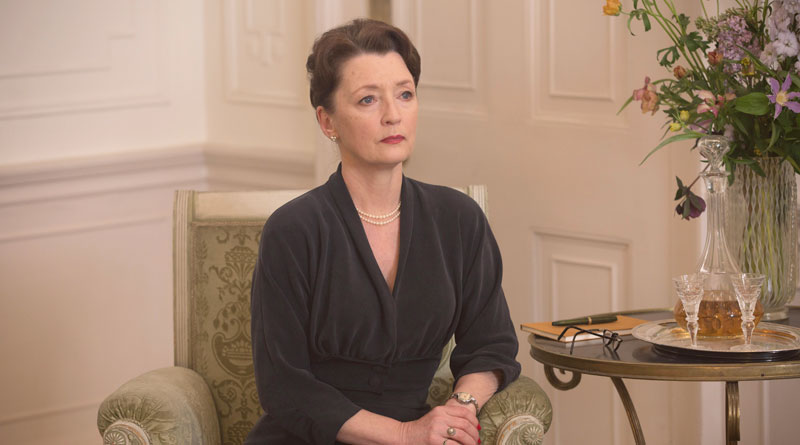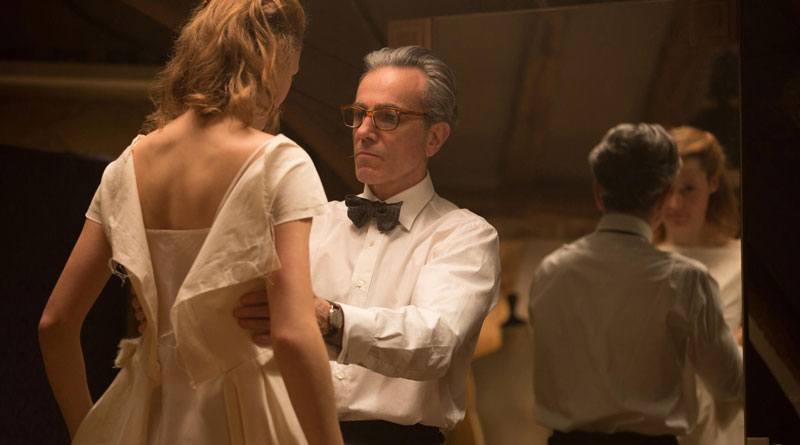Oscars 2018 Review: Phantom Thread
Phantom Thread takes place in the 1950s London where Reynolds Woodcock (Daniel Day-Lewis) runs a renowned his eponymous house of couture with the help of his sister, Cyril (Leslie Manville) and other dressmakers. One day, his meticulous life changes when he meets and falls in love with a waitress named Alma (Vicky Krieps).
Words like “chilly” and “methodical” are best described for Paul Thomas Anderson’s latest drama in Phantom Thread, his first directorial effort in three years since 2014’s Inherent Vice. Besides, those aforementioned selected words are something that the late Stanley Kubrick would do if he still alive. If you are a fan of Kubrick’s works, you’ll know what I’m talking about when you watch this movie.
Phantom Thread immerses you with Jonny Greenwood’s piano-laden score, both lush and elegant at the same time. This is already evident enough during the opening sequence as we witness Daniel Day-Lewis’ Reynolds Woodcock preparing his morning routine from shaving to putting on his clothes. Such a scene would have been nothing special or significant if it falls into the hands of a lesser director. But the combination of Paul Thomas Anderson’s framing precision and Jonny Greenwood’s classical music compositions brilliantly reflects Woodcock’s meticulous preparations. After all, he is a perfectionist where an absolute orderliness must be well-planned every single minute of his day. Take breakfast, for instance. He doesn’t like “confrontation” or be unnecessarily disturbed for that matter when he’s in the kitchen sketching while drinking tea.

Of course, this is made possible — no, make that perfectly possible — by the great Daniel Day-Lewis. Yes, it was a huge loss that he announced his retirement from acting back in June last year. But putting that aside, his performance as a fussy couturier is one of his finest performances to date.
Day-Lewis also paired well with Vicky Krieps, a Luxembourgian actress previously appeared in movies like Joe Wright’s Hanna (2011) and Anton Corbijn’s A Most Wanted Man (2014). Their chemistry instantly sparks the moment she met Woodcock for the first time in the restaurant while taking his order. But Vicky’s Alma is more than just a lovely smile and a beautiful face. As the movie progresses further, we learn more about her true colour and her relationship with Woodcock. This is where Vicky excels the most. She’s a scene-stealer, particularly how she’s willing to remain steadfast and persuasive to get what she wants.
Despite remarkable performances from both aforementioned actors, Phantom Thread is far than a two-person chamber piece. Leslie Manville is also worth mentioning here as well, with her solid yet commanding performance as Reynolds Woodcock’s sister, Cyril.

The movie also benefits from Paul Thomas Anderson’s suitably icy direction that again, reminds me of the late Stanley Kubrick’s filmmaking method. Every detail from acting to its technical credits are all top-notch. Anderson, who also served as an uncredited cinematographer, evokes a certain sense of exquisiteness to the overall look and feel of the movie. Not to forget is the script written by Anderson himself, combining his love for black comedy with a dose of a thriller-like genre and a 50s-set classic love story. Speaking of black comedy, look out for the asparagus dinner moment — easily the most memorable scene in the movie.
While Anderson successfully explored the toxic relationship between Woodcock and Alma, Anderson somehow loses steam in the third act. Let’s just say the ending feels anticlimactic. Still, it’s a minor shortcoming. Phantom Thread remains a great movie from Paul Thomas Anderson and of course, for all the three principal actors involved.






I will have to see this movie! Thanks for the review 🙂
Elena
http://www.twofeelswrite.com
You are welcome, Elena 🙂